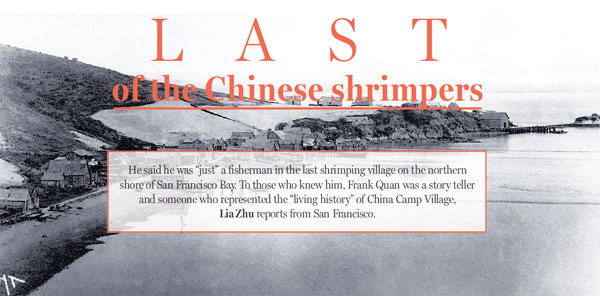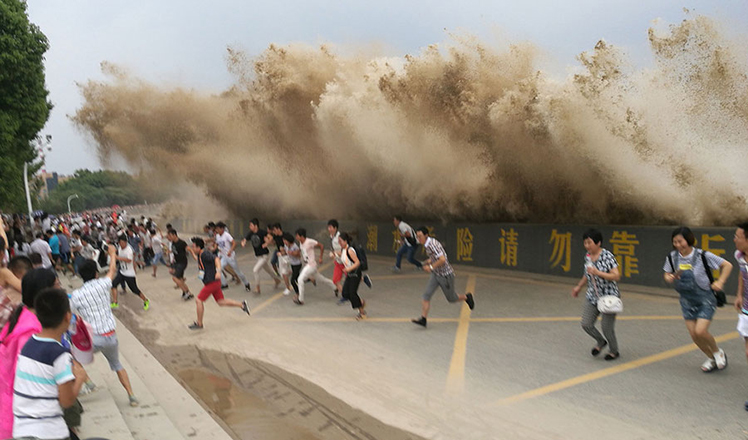Last of the Chinese shrimpers
Updated: 2016-09-09 11:36
By Lia Zhu(China Daily USA)
|
|||||||||

"We also must work to make the lives, experiences, and histories of Frank and others part of mainstream history. Only in this way is it possible for us to find real inclusion and acceptance in America today," he said.
The history of Chinese railroad workers has received considerable attention but the stories of Chinese shrimp fishermen have not yet, said Lai.
"China Camp is more than just a home or a park; it's a witness to the history of Chinese settlers who crossed the ocean, endured hardships and discrimination and survived in the American land," he said. "It's the shared memory of all Chinese Americans."
As the Transcontinental Railroad was completed, Chinese immigrants came to San Francisco looking for work. Many became laborers at the McNear ranch, owned by John A. McNear, the great great grandfather of Kuhn.
They supplemented their income by fishing for shrimp along the shores of San Pablo Bay, setting up temporary camps around the McNear property, which later became the China Camp.
In the 1880s during its heyday, China Camp Village had almost 500 residents and several streets lined with wooden buildings. More than 3 million pounds of shrimp were harvested from the Bay each year, and most was dried and prepared for export to China.
Then vicious anti-Chinese sentiment swept California. To avoid discrimination of the cities, Quan Hung Quock, Frank's grandfather, moved to China Camp from San Francisco's Chinatown in 1895. He built a general store there and raised a family.
Anti-Chinese
Over the next few decades after the passage of the Chinese Exclusion Act in 1882, additional discriminatory laws were passed against the Chinese fishermen, making their life even harder.
The export of shrimp was outlawed in the early 1990s, striking a severe blow to China Camp's economy. Then, the height of shrimping season was closed and the use of traditional bag nets favored by the Chinese was prohibited.
As a result, the population of China Camp Village declined until only one family - the Quans - was left carrying on shrimping in the bay.
"Frank told me he used to go shrimping twice a day, and usually caught hundreds of pounds every time," said Lai.
But after the diversion of river water made the bay too salty for shrimp to thrive, he would be lucky if he could catch one or two pounds, and most of his catch was sold as bait, he said.
Sharing a similar history, China Beach, a small, sandy cove in San Francisco's Sea Cliff area, used to be a camp for Chinese fishermen to anchor their fishing boats because they were not allowed to dock at Fishermen's Wharf.
A large monument with the Chinese characters for "China Beach" inscribed on it was erected in 1982 to honor the Chinese fishermen who had worked in the San Francisco Bay during the wave of anti-Chinese sentiment.
Compared with the Fishermen's Wharf, only five miles away, China Beach is much quieter and less known by the Chinese tourists who flock to the popular attractions such as the Fishermen's Wharf, Golden Gate Bridge and Lombard Street.
"It appeals to a niche market," said Jinyu Qin, product development manager of Tours for Fun, a Los Angeles-based tour agency specializing in customized tours for Chinese tourists.
"Most of the Chinese tourists would like to go to those more well-known sites but I think there is potential for those who are interested in culture and history," she said. "The challenge is how to better present the history and provide docent service."
Lai, who helps in his docent tours with Chinese visitors, said the sudden loss of Quan was a big blow to the park.
"No stories of China Camp will be told anymore," he said, adding that the old man told stories to a group of students from Dominican University only one day before he died.
To honor Quan, Friends of China Camp decided to cancel the celebration of the annual heritage day in August and plans to celebrate his life at the park on Oct 15.
The next question they face is the fate of Quan's home, store and caf.
"Since they are the state's properties, we'll talk with the state park department about how to preserve buildings," Lai said.
The message
To Kuhn, CEO of a non-profit organization called "Roots of Peace", China Camp gave her one message: love and respect people.
"My great grandfather esteemed the contribution of the Chinese people who helped build the Transcontinental Railroad across the US," she said.
Her great-grandfather, who owned thousands of acres of land in east San Rafael at that time, thought the discrimination laws were unfair to the Chinese, and he offered to let them live on his property, charging $1 a year rent, she said.
"That's very affordable, symbolic," said Kuhn. "The Chinese were contributing to the American economy. They became a vital part of the economy of the community."
At a time when the Chinese were made scapegoats for taking away the jobs of Americans, nobody would work with Chinese people, she said.
"My grandfather loved Chinese people. He even learned Chinese to converse with them," said Kuhn. "My father as a young boy helped clean out the storage of the dried shrimp."
"It was so beautiful to see my father walking along the beach with his childhood friend, reminiscing about China Camp, and sharing together stories of healing social injustices," she said.
Contact the writer at liazhu@chinadailyusa.com
Congjiang Wang contributed to this story.
- Three women planning 'imminent' attacks arrested in France: minister
- China, Britain vow to deepen military exchanges, mutual trust
- British parliament to debate second Brexit referendum petition
- Chinese women find their way through the glass ceiling
- Rousseff leaves presidential residence in salutation
- Thousands of Chinese rally in Paris to call for 'security for all'

 Sights and sounds of Premier Li's visit to Laos
Sights and sounds of Premier Li's visit to Laos
 Yao Ming and Class of 2016 receive Hall of Fame jackets
Yao Ming and Class of 2016 receive Hall of Fame jackets
 Bullet train attendants strut new look in Xi'an
Bullet train attendants strut new look in Xi'an
 Ten photos from around China: Sept 2 - 8
Ten photos from around China: Sept 2 - 8
 Turning mud into work of art
Turning mud into work of art
 Unforgettable moments of Premier Li at ASEAN meeting
Unforgettable moments of Premier Li at ASEAN meeting
 Six policy signals China sent at G20 Summit
Six policy signals China sent at G20 Summit
 'First Lady table ware' a hit in Hangzhou
'First Lady table ware' a hit in Hangzhou
Most Viewed
Editor's Picks

|

|

|

|

|

|
Today's Top News
Trump outlines anti-terror plan, proposing extreme vetting for immigrants
Phelps puts spotlight on cupping
US launches airstrikes against IS targets in Libya's Sirte
Ministry slams US-Korean THAAD deployment
Two police officers shot at protest in Dallas
Abe's blame game reveals his policies failing to get results
Ending wildlife trafficking must be policy priority in Asia
Effects of supply-side reform take time to be seen
US Weekly

|

|









